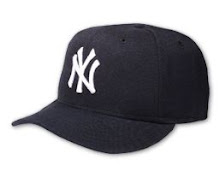Left field ump Sam Holbrook raises his hand in the air like he just don't care.
Wait, what? They didn't. My bad. I thought for sure that the call that was made in last night's St. Louis-Atlanta "play-in" wild card game had to be done by a NFL replacement ref.
Now I get it. It was just the usual pitiful Major League Baseball umpiring, which year in and year out makes horrendous calls in the post-season. And these guys are supposed to be the best and brightest among MLB umps.
With the Yankees playing the Orioles, we'll all get to see plenty of replays of little Jeffrey Maier interfering with Derek Jeter's 1996 ALCS home run. Richie Garcia was the ump in question on that one; wonder if O's right fielder (and later Yankee) Tony Tarrasco has gotten over that.
There was the Phil Cuzzi, who called Joe Mauer's clear double a foul ball in the 2009 ALDS between the Twins and Yankees. I won't go back to the Don Deckinger fiasco that cost the Cardinals a World Series championship in 1985. That's just a small sampling of the horrible job umpires have done in the playoffs. And as everyone knows the regular season sees more than it share of bad calls and bad strike zones.
This year Jerry Meals possibly cost the Yankees a game agains the Orioles when he called Mark Teixeira out on a game ending play at first base. The tying run would have scored on the play; fortunately for the Yankees the loss didn't cost them the division. Meals also made a horrible call in extra innings between the Pirates and Braves last year. Jim Joyce cost Armando Galarraga a perfect game back in 2010 when he blew an out call at first base.
This year Jerry Meals possibly cost the Yankees a game agains the Orioles when he called Mark Teixeira out on a game ending play at first base. The tying run would have scored on the play; fortunately for the Yankees the loss didn't cost them the division. Meals also made a horrible call in extra innings between the Pirates and Braves last year. Jim Joyce cost Armando Galarraga a perfect game back in 2010 when he blew an out call at first base.
But back to last night's Cardinals-Braves game; the call in question may not have changed the outcome of game, but we'll never know.
The Braves were down 6-3 and had two aboard when Andrelton Simmons lifted a pop up to shallow left field. Cardinals shortstop Pete Kozma and left fielder Matt Holliday converged on the ball and both gave up (mainly Kozma) on it. The ball dropped to the ground and the Braves had the bases loaded...but then they didn't.
An INFIELD FLY is a fair fly ball (not including a line drive nor an attempted bunt) which can be caught by an infielder with ordinary effort, when first and second, or first, second and third bases are occupied, before two are out. The pitcher, catcher and any outfielder who stations himself in the infield on the play shall be considered infielders for the purpose of this rule.Left field umpire Sam Holbrook had raised his arm for an infield fly and an automatic out. But Holbrook raised his arm too late and the location of the baseball was also "iffy" to even call the infield fly.
When it seems apparent that a batted ball will be an Infield Fly, the umpire shall immediately declare “Infield Fly” for the benefit of the runners. If the ball is near the baselines, the umpire shall declare “Infield Fly, if Fair.”
The ball is alive and runners may advance at the risk of the ball being caught, or retouch and advance after the ball is touched, the same as on any fly ball. If the hit becomes a foul ball, it is treated the same as any foul.
If a declared Infield Fly is allowed to fall untouched to the ground, and bounces foul before passing first or third base, it is a foul ball. If a declared Infield Fly falls untouched to the ground outside the baseline, and bounces fair before passing first or third base, it is an Infield Fly.
Rule 2.00 (Infield Fly) Comment: On the infield fly rule the umpire is to rule whether the ball could ordinarily have been handled by an infielder—not by some arbitrary limitation such as the grass, or the base lines. The umpire must rule also that a ball is an infield fly, even if handled by an outfielder, if, in the umpire’s judgment, the ball could have been as easily handled by an infielder. The infield fly is in no sense to be considered an appeal play. The umpire’s judgment must govern, and the decision should be made immediately.
When an infield fly rule is called, runners may advance at their own risk. If on an infield fly rule, the infielder intentionally drops a fair ball, the ball remains in play despite the provisions of Rule 6.05 (L). The infield fly rule takes precedence.
Manager Fredi Gonzalez argued vehemently, protested the game, and the Braves' fans littered the field with garbage (which was asinine no matter how bad the call was). The fiasco led to a 19-minute delay and the Braves were, for all intents and purposes, done. (The protest was, of course, overturned.)
It's a shame that calls like this happen year after year, especially when it's in the post-season. Perhaps instead of finding more revenue streams, Bud Selig could find a method to ensure that today's umpires aren't total screw ups.













You will pay in blood Sam Holbrook
ReplyDelete